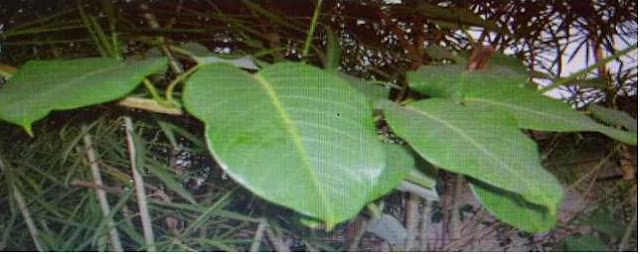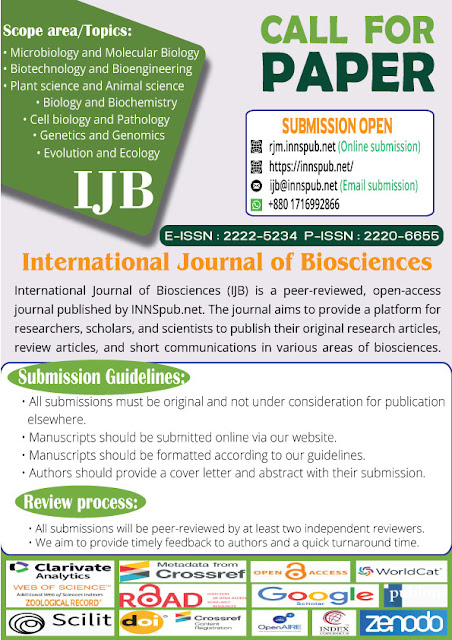Ta Bi Irié Honoré, Dro
Bernadin, Ake Claude Bernard, Ake-Assi Ablan Emma, N’guessan Koffi, University
of Man, Côte d’Ivoire, UFR Agronomic Forestry, and Environmental Engineering
(IAFE), from the different institute of the Côte d'Ivoire. wrote a research
article about, Assessing Anti-Inflammatory Properties of Parquetina nigrescens
Extracts. entitled, Evaluation of the anti-inflammatory activity of aqueous
extracts from Parquetina nigrescens (Afzel.) Bullock (Apocynaceae). This
research paper published by the International Journal of Biosciences (IJB). an
open access scholarly research journal on Biosciences. under the
affiliation of the International Network For Natural Sciences |
NNSpub. an open access multidisciplinary research journal publisher.
Abstract
The decoction of the
leaves of Parquetina nigrescens (Apocynaceae) is used by Ivorian
traditional healers for the treatment of inflammation. Regarding this
traditional practice, the present study aimed at evaluating through outa
scientific approach the anti-inflammatory activity of the aqueous extracts
from Parquetinanigrescens leaves. The extracts were tested according
to the model of acute rat paw oedema induced by 1% carrageenan. Several doses
of phytomedicines were administered orally to the animal sand ranging as
follows: 1600, 2400, 4800 mg/kg. The results obtained with the aqueous extracts
of Parquetinanigrescens leaves were firstly compared with those of
physiological control (NaCl 0.9%) and thereafter with those of the reference
(diclofenac sodium 25 mg/kg). The comparisons were performed at 1 hour, 2
hours, 3 hours, 4 hours, 5 hours, 6 hours, 12 hours and 15 hours after
injecting carrageenan into rats. The parameters considered for this
purpose arethe percentage increase of paw circumference (%AUG) and the
percentage inhibition of treatment (%INH). Thus, therewas a significant
difference (p<0.001) between the %AUG of phytomedicine treatment at
different doses and those of saline (NaCl). However, for a dose of 4800 mg/kg,
when administered byoralroute, the AUG of the phytomedicine are statistically
the same as those of diclofenac (25 mg/kg). Comparisons of %INH leadto similar
results with %AUG. This study, therefore, confirms the anti-inflammatory
properties of Parquetina nigrescens leaves and emphasizes the
empirical use of that plant species in the treatment of inflammation.
Read more : Otolith Morphology of Cichlidae Species in Lake Buyo, Côte d’Ivoire | InformativeBD
Introduction
Current knowledge
places the beginning of humanity at around seven million years ago (Ta et al.,
2023). Since that time, man has used plants (Fleurentin, 2007). This is
explained by the use of plant in various areas of life (housing, health, food).
The health field has given rise to a science called ethnomedicine.
Ethnomedicine is defined as the set of beliefs and practices relating to
illness in each given society (Laurence, 2021). It is also known as traditional
medicine, which is highly developed in African countries. According to traditional
medicine, no disease is incurable. It offers treatments for all kinds of
diseases: cardiovascular diseases, metabolic diseases and especially
inflammatory diseases. Related to inflammation, it is above all a defense
mechanism, aiming to neutralize the attacking agent and eliminate damaged
tissues (Souhel, 2010). In modern medicine, this health condition is treated
with chemical compounds known as steroidal and non-steroidal
anti-inflammatories (Ta-Bi et al., 2018). Unfortunately, these drugs provoque other
health damages in humans, particularly cardiovascular diseases (Heymonet, 2013;
Ta, 2017). Therefore, the use of phytomedicines is increasingly encouraged.
Previous ethnomedicinal report in Côte d’Ivoire mentioned the use of Parquetina
nigrescens leaves extract in the treatment of anti-inflammatory condition
(N'guessan, 2008). Although no scientific investigation was performed in Côte
d’Ivoire, the antiinflammatory effect of that plant species was carried out
elsewhere like in Nigeria (Owoyele et al., 2009). But the methodology used in
this study is different and will be of interest to compare both studies or
confirm scientifically the potential of Parquetina nigrescens leaves in
inflammation removing. The objective of this study is therefore to seek scientific
bases of the use of leaf decoction against inflammatory diseases by traditional
medicine form from Côte d’Ivoire.
Reference
Aké-Assi E, N’guessan
K, Kouassi AF. 2015. Evaluation of the acute toxicity of the aqueous
extract of the leaves of Thunbergia atacorensis, a new species. European
Scientific Journal 11(27), 92-100. https://core.ac.uk/download/pdf/236413487.pdf
Epa C, Elion IRDG, Etou
OAW, Attibayéba, Ongoka PR, Abena AA. 2015. Anti-inflammatory and healing
effect of aqueous and ethanolic extracts of the trunk bark of Buchholzia
coriacea Engl. (Capparidaceae). Journal of Applied Biosciences 94, 8858–8868. https://www.ajol.info/index.php/jab/article/view/127709
Fleurentin J, Hayon JC,
Pelt JM. 2007. Plants that heal us-traditions and therapeutics. Editions
Ouest-France, 7-14 p.
Heymonet C. 2013.
Anti-inflammatory plants used in herbal medicine. Doctorate thesis in Pharmacy,
Faculty of Pharmacy, University of Lorraine, 199 p. https://hal.univ-lorraine.fr/hal-01733269
Hoekou YP, Tchacondo T,
Gbogbo AK, Agban A, Pissang P, Atakpama W, Karou SD, Batawila K, Akpagana K. 2016.
Antimicrobial activities of Parquetina nigrescens (Afzel.) Bullock, a
plant used in medicine Togolese tradition in the treatment of microbial
infections. Africa Science 12 (5), 182-188. https://www.researchgate.net/publication/
Kouamé YY, Okpekon AT,
Yapi HF, Gbassi KG. 2016. Evaluation of anti-inflammatory activities of
aqueous and ethanolic extracts of Xylopia villosa (Anonaceae). Asian
Journal of Biochemical and Pharmaceutical Research 6(3), 106-112. https://www.researchgate.net/publication/
Laurence P. 2021.
Ethnomedicine. Anthropen, The French-speaking dictionary of anthropology
anchored in the contemporary, 4 p. https://revues.ulaval.ca/ojs/index.php/anthropen/article/view/51288
N’diaye M, Sy G, Dièye
AM, Touré MT, Faye B. 2006. Evaluation of the anti-inflammatory activity
of Annona reticulata (annonaceae) leaves on acute induced rat paw
edema by carrageenan. Pharm. Med. Trans. Afr. 2006, Vol. XIV: 179-186. https://docplayer.fr/37640171-Evaluation-de-l-activite-anti-inflammatoire-de-feuilles.html
N’Guessan K. 2008.
Medicinal plants and traditional medical practices among the Abbey and Krobou
peoples of the Agboville Department (Côte d’Ivoire). State Doctorate Thesis in
Natural Sciences, Ethnobotany Specialty, University of Cocody-Abidjan (Côte
d’Ivoire), UFR Biosciences, Botany Laboratory, 235 p.
Nuhrich A. 2015.
Non-steroidal anti-inflammatories. Report from the UFR of Pharmaceutical
Sciences of the University of Bordeaux-France, 59 p. http://untori2.crihan.fr/unspf/2015_Bordeaux_Nuhrich_AINS/res/AINS_A_Nuhrich_2015.pdf
Owoyele BV, Nafiu AB.,
Oyewole IA., Oyewole LA, Soladoye AO. 2009. Studies on the analgesic,
anti-inflammatory and antipyretic effects of Parquetina nigrescens leaf
extract. Journal of Ethnopharmacology: 122, 86-90. http://dx.doi.org/10.1016/j.jep.2008.11027
Souhel M. 2010.
Analysis of the prescription of non-steroidal anti-inflammatories in the
reference health center of commune III of the Bamako district. Doctorate thesis
in pharmacy. University of Bamako.
Soro TY, Néné-bi AS,
Zahoui OS, Yapi A, Traoré F. 2015. Anti-inflammatory activity of the
aqueous extract of Ximenia americana (Linnae) (Olacaceae). Journal of
Animal & Plant Sciences24(3), 3802-3813. https://www.researchgate.net/publication/279531975
Ta BIH, Aké CB, Konkon
NG, N’Guessan K. 2018. Evaluation of the anti-inflammatory activity of aqueous
extracts from Corchorus olitorius (Malvaceae). The Pharma Innovation
Journal 7(4), 800-802. https://www.thepharmajournal.com/archives/2018/vol7issue4/PartM/7-4-41-596.pdf
Ta BIH.2017.
Ethnobotanical, phytochemical and pharmacodynamic studies of some species of
the genus Corchorus L., recorded in Côte d’Ivoire. Single Doctoral
thesis, UFR Biosciences, Félix Houphouet Boigtny University of Abidjan, 142 p.
Ta BIH, Doh KS, Yéo S,
Aké-Assi E, N’Guessan K. 2023.Study of the acute toxicity of aqueous
extracts of alchornea cordifolia (euphorbiaceae) and tithonia diversifolia
(asteraceae), two plants frequently cited in traditional medicine of Ivory
Coast. Rev. Ivory. Sci. Technol. 42, 349-362. https://revist.net/REVIST_42/21-ST-935.pdf











%20in%20full.JPG)


0 comments:
Post a Comment